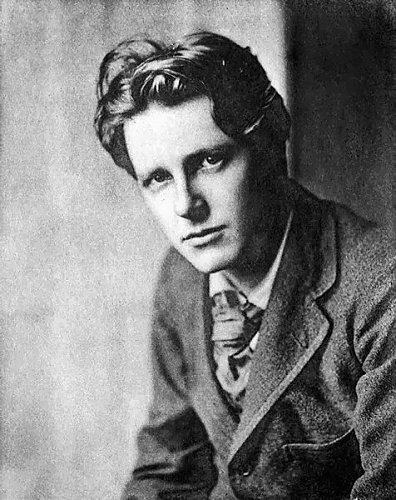The Soldier Summary And AnalysisIntroductionRupert Brooke wrote the poem "The Soldier" in 1914, which was the initial year during the First World War. It is a poem that depicts a soldier's affection for his country?in this case, England, which is represented as a type of nurturing paradise?in a very idealistic and patriotic way. The soldier's connection to England is so strong that he believes it to be the beginning of his life and the place where his mind will return after death. The poem, which captured the initial excitement of the war (before the sad realities of a protracted fight became apparent), was well-liked by the general people at the time). Today, the poem is perceived as being a little naive and providing little insight into the reality of battle. Despite this, it unquestionably captures and distils a specific kind of patriotism. 
About The PoetRupert Brooke, who was born in 1887, had a relaxed upbringing in a privileged environment while living close to and later attending the prestigious British school Rugby, where his father served as a housemaster. His reputation remained unaffected by his 1906 transfer to King's College, Cambridge, where he made friends with E.M. Forster, Maynard Keynes, and Virginia Stephens (later Woolf), and expanded into acting and socialism, eventually rising to the position of president of the Fabian Society at the University. Rupert Brooke relocated outside of Cambridge and took up residence in Grantchester, the place he focused on a thesis and wrote poems that reflected his vision of English country life. Many of these poems were later collected in his first book, simply titled Poems 1911. Additionally, he travelled to Germany and studied there. 
Rupert Brooke, a poet, academic, activist, and aesthete who died while serving in World War One, was recognized as one of the greatest poetry soldiers in British history by his poetry and literary allies. Although his lyrics are commonplace in the military, others have claimed that they glorify war. In all fairness, Brooke witnessed the carnage firsthand, but he was unable to witness the evolution of World War I. By April 10, Brook's ship was again in motion, and on April 17, it anchored off an island of Skyros. Rupert, who had previously been unwell, was put in a life-threatening situation when an insect bite led to blood poisoning. On the afternoon of April 23, 1915, he passed away at Tris Boukes Bay while aboard a medical ship. Theme Of The PoemRupert Brooke wrote "The Soldier" as a classical sonnet in 1914. The two most potent elements that evoke readers' emotions are love and death, which are the poem's main topics. Death because he will be a soldier in the First World War, and love because he will love his country. Rupert Brooke explores the bravery, nationalism, and self-sacrifice issues from the viewpoint of a British soldier. Through doing so, the author conceals the gloomy sides of battle while evoking the beauty of protecting and dying for one's nation. Summary Of The PoemRupert Brooke wrote the military poetry "The Soldier." It is a sonnet, this poem. The poet expresses his affection for his nation in this poem. The poet, who is also a soldier, has enlisted to defend his nation by fighting abroad. He claimed that a soldier serves his country both during life and death. The poet desires to give his life in defense of his nation. He asserts that he is going to be buried there if he passes away while defending his motherland in a foreign country. He desires the property on which his corpse will be interred. and ought to be considered as an integral part of England. He was born and raised in his nation, thus he has wonderful memories of it. He has a deep affinity for the natural beauty of his nation. He cherishes his homeland's sights and noises and also thinks of his buddies. He claims that his nation has given him air to breathe and flowers to love. These things all reflect the poet's ardent affection and love for his native country. As a result, the poet expresses his love and devotion for his nation in this poem. This poem is incredibly patriotic and dedicated to England. Analysis Of The Poem"IF I should die, think only this of me: The verse begins with what could be described as a sensation of dread. Although one would assume that this suggests the poem's deceptive character given that it practically condones death in battle rather than denouncing it. This nearly contradicts General Patton's famous quote, "The subject of war is to not die for the nation you love but to have the opposing bastard die for his" The poem's tone is set by the first line, which almost gives the impression that the writer is confessing a piece of writing or journal. The narrator immediately turns his impending death into a positive after his second and third lines. Unfortunately, there were no positions for women in the military at the commencement of the First World War, and thus it is reasonable to presume the narrator is a guy. He mentions dying in an alien field, therefore a battlefield is probably meant by this. The poet extends the image of dust in the fifth line by describing how England produced and moulded that dust. The idea that he is trying to convey is the notion that he is the very core of England, although the broader implication is that each soldier who sacrifices their life for their nation meets the same standard. that because soldiers are "shaped" by England when they die abroad, they disseminate Englishness practically like seeds. 
The Octave's final three lines are rife with nationalistic ideas. They do a great job of presenting a positive image of England. This is accomplished through invoking the natural world. Speaking of rivers, flowers, and the air, they all contribute to the perception of England as a lovely country. By doing that, the narrator suggests that a soldier would be able to assist in transporting the precise pieces that contributed to that beauty to another nation. If this action ever took place, it would undoubtedly be exceedingly honorable. "And think, this heart, all evil shed away, The second stanza of a sonnet frequently introduces a fresh idea. The first phrase in this instance gives the impression that the speaker is adding another thought. "and think this" gives the impression that he has experienced a revelation. In the last tercet, the poem comes to an end. This is another instance of praising English culture. By appealing to the senses, this is given a visceral feeling. It's not just about the way England looks; it's also about how it sounds. These explanations virtually serve as a justification for the first stanza's statements. The second stanza supports the first stanza's argument that it is acceptable to die in battle if it benefits your country by saying, "Look, this is what you'd be dying for, isn't it great? "The last line is quite smart. It conveys the idea that dying on the battlefield results in peace by using extremely uplifting rhetoric. ConclusionIn light of all the magnificent and lovely things his beloved homeland has given him and how she has shaped who he is, he concludes that just his blood will be the proper gift to give. The poem's soldier speaker seeks redemption by making a sacrifice in defense of the nation. The film "The Soldier" examines the connection between a loyal British soldier & his country. The poem suggests that people are shaped by their native environments and cultures and that their nation is something worth preserving with their lives via this soldier's passionate description of his connection to England. It emphasized the bravery displayed by warriors while exalting the deeds of mankind. The Soldier consistently uses this motif. It refers to the heart, which is merged with eternity and free from all prejudice and ill will. And it will continue to exist, savoring the exquisite memories that the English country bestowed on him. Thus, the sonnet's beauty and significance derive from a preexisting sense of oneness to England. |
 For Videos Join Our Youtube Channel: Join Now
For Videos Join Our Youtube Channel: Join Now
Feedback
- Send your Feedback to [email protected]
Help Others, Please Share









